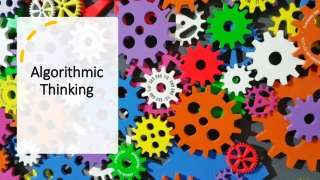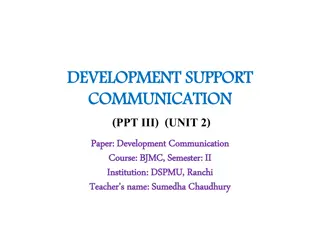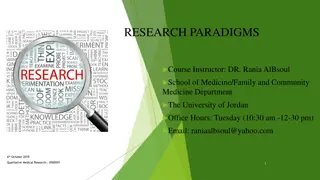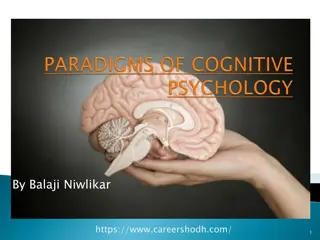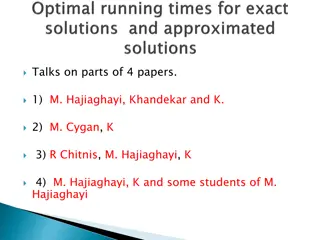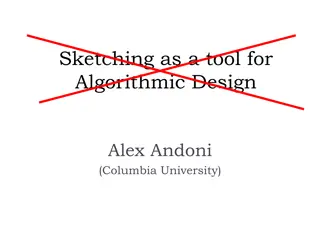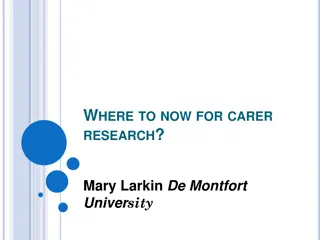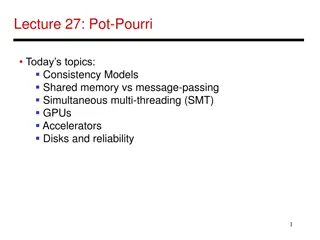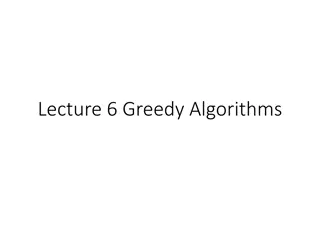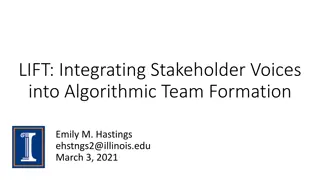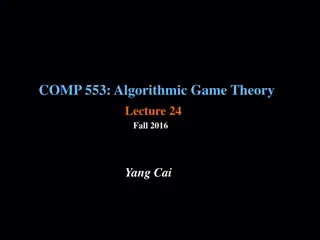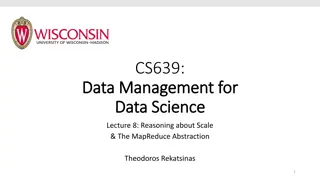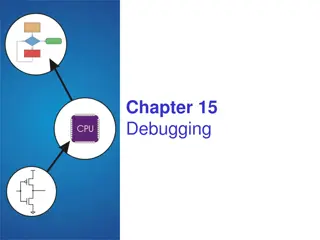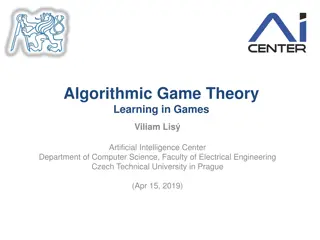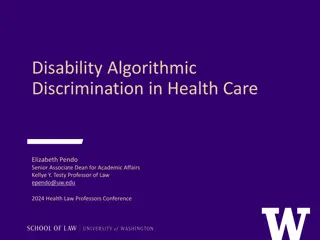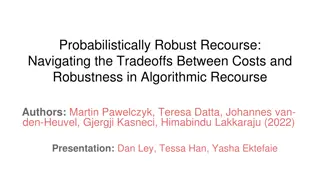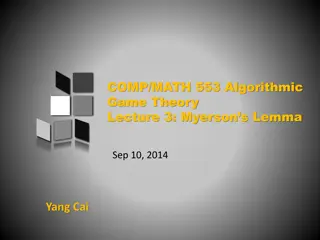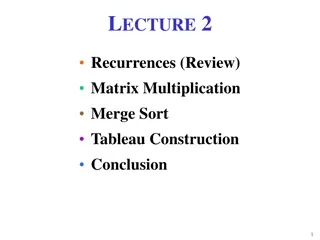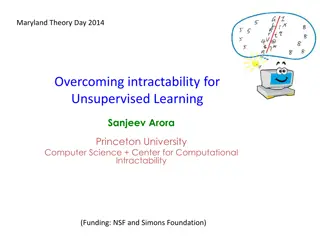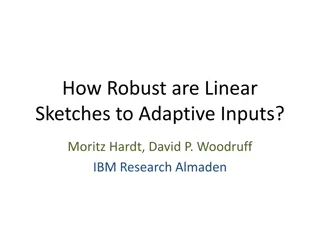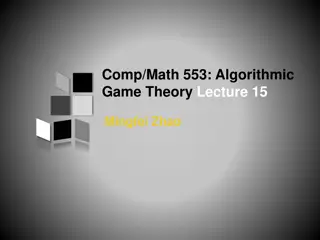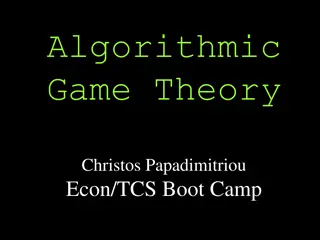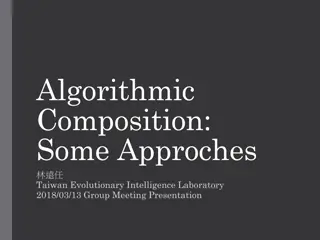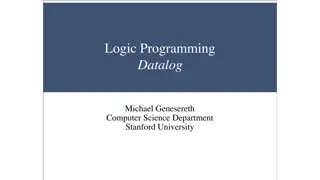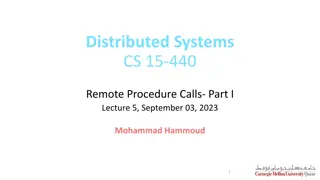Physics Data Processing
The efficient computing and accelerated results in physics data processing, algorithmic design patterns, software infrastructure, and trusted collaboration. Discover the three pillars of Nikhef and the infrastructure for research.
3 views • 15 slides
Understanding Algorithmic Thinking: Key Concepts and Importance
Algorithmic thinking is a crucial skill that involves problem-solving through precisely defined instructions. This competency, applicable beyond computing, entails analyzing problems, identifying steps to solve them, and designing efficient algorithms. The importance of algorithmic thinking lies in
1 views • 13 slides
HotFuzz: Discovering Algorithmic Denial-of-Service Vulnerabilities
A detailed exploration of algorithmic complexity bugs and insight into distributed micro-fuzzing methods. The study uncovers vulnerabilities through guided micro-fuzzing approaches, emphasizing the importance of AC bug detection and fuzz testing techniques such as seed inputs, fuzz observations, and
0 views • 14 slides
Evolution of Development Communication Paradigms and Alternative Paradigm
Development Communication explores the stages of creating a plan, implementing strategies, and ownership paradigms in development projects. Emphasis is on participatory approaches, community empowerment, and inverting top-down processes. The concept of Alternative Paradigm emerges to counter the ali
2 views • 6 slides
Understanding the Right to an Explanation in GDPR and AI Decision Making
The paper delves into the necessity for Explainable AI driven by regulations such as the GDPR, which mandates explanations for algorithmic decisions. It discusses the debate surrounding the existence of a legally binding right to explanation and the complexities of accommodating algorithmic machines
0 views • 22 slides
Understanding Research Paradigms in Qualitative Medical Research
Delve into the world of research paradigms in qualitative medical research with a focus on the key differences between objective and subjective research, the meaning of research paradigms, components of research paradigms, types of research paradigms, and how paradigms guide the selection of researc
0 views • 42 slides
Qualitative vs. Quantitative Approaches in Health Research
Exploring the different methodologies, paradigms, and methods used in health research, this content highlights the distinction between qualitative and quantitative designs. It covers research questions, aims, objectives, hypotheses, and various quantitative approaches such as experimental and observ
1 views • 28 slides
Exploring Paradigms of Cognitive Psychology
Cognitive psychology, a branch of psychology, delves into mental processes like thinking, perceiving, remembering, and learning. This field views individuals as information processors, with paradigms guiding research methodologies. Key approaches include Information Processing, Connectionist, Evolut
0 views • 18 slides
Evolution of Algorithms and Computer Science Through History
The history of algorithms and algorithmic thinking dates back to ancient times, with the development of general-purpose computational machines by Charles Babbage in the 19th century marking a significant advancement. The term "computer science" emerged in 1959, encompassing theoretical computer scie
1 views • 39 slides
Computational Thinking, Algorithms & Programming Overview
This unit covers key concepts in computational thinking, including decomposition, abstraction, and algorithmic thinking. Decomposition involves breaking down complex problems, abstraction focuses on identifying essential elements, and algorithmic thinking is about defining clear instructions to solv
1 views • 5 slides
Understanding Algorithmic Thinking in Digital Systems
Explore the application of algorithmic thinking in digital systems through the journey of Mike Clapper, the Executive Director of AMT. Learn about recognizing patterns in data, creating algorithms to solve problems, and utilizing information systems creatively. Enhance your knowledge of digital syst
0 views • 56 slides
Insights into Advanced Algorithmic Problems
Delve into discussions surrounding complex algorithmic challenges, such as the limitations in solving the 3-SAT problem within specific time bounds, the Exponential Time Hypothesis, proving lower bounds for algorithms in various scenarios, and exploring approximation ratios in algorithm design. Thes
1 views • 65 slides
APL - A Functional Language with Array Paradigms
APL, named after the book "A Programming Language Paradigms," is a functional language with a focus on array manipulation. Developed in the 1960s by Kenneth E. Iverson, it has had a significant impact on the development of spreadsheets and computer math packages. APL operates with chains of monadic
0 views • 11 slides
Innovations in Social Work Research: Emerging Topics and Paradigms
Explore the latest trends in social work research at the 2016 Joint World Conference on Social Work, Education, and Social Development. Discover topics such as global change, indigenous concerns, and migration issues. Delve into research paradigms, methodologies, and challenges, including the impact
0 views • 8 slides
Implementing Strategic Areas for Non-Communicable Disease Prevention
Implementation of national prevention and control programs for non-communicable diseases is crucial for sustainable healthcare systems. Collaborating with multidisciplinary groups and shifting advocacy paradigms towards human rights and social determinants of health are essential. A transformation i
1 views • 20 slides
Insights into Recent Progress on Sampling Problems in Convex Optimization
Recent research highlights advancements in solving sampling problems in convex optimization, exemplified by works by Yin Tat Lee and Santosh Vempala. The complexity of convex problems, such as the Minimum Cost Flow Problem and Submodular Minimization, are being unraveled through innovative formulas
1 views • 47 slides
Sketching as a Tool for Algorithmic Design by Alex Andoni - Overview
Utilizing sketching in algorithmic design, Alex Andoni from Columbia University explores methodologies such as succinct efficient algorithms, dimension reduction, sampling, metric embeddings, and more. The approach involves numerical linear algebra, similarity search, and geometric min-cost matching
0 views • 18 slides
Exploring Carer Research Trends in the UK: A Critical Analysis
Research conducted at De Montfort University explores the evolution of carer research paradigms in the UK since 1995, aiming to critique the relationship between research/theory and our understanding of carers. Through multi-stage reviews and analysis, the study delves into key dimensions of carer r
0 views • 26 slides
Understanding Memory Consistency Models and Communication Paradigms in Computer Systems
Memory consistency models define the ordering of writes and reads in computer systems. Coherence ensures write propagation and serialization, while consistency models guide programmers in writing correct programs. Shared-memory and message-passing are two communication paradigms with different appro
0 views • 31 slides
Algorithmic Issues in Tracking: A Deep Dive into Mean Shift, EM, and Line Fitting
Delve into algorithmic challenges in tracking tasks, exploring techniques like mean shift, Expectation-Maximization (EM), and line fitting. Understand the complexities of differentiating outliers and inliers, with a focus on segregating points into best-fit line segments.
0 views • 44 slides
Understanding Greedy Algorithms in Algorithmic Design
Greedy algorithms in algorithmic design involve making the best choice at each step to tackle large, complex problems by breaking them into smaller sub-problems. While they provide efficient solutions for some problems, they may not always work, especially in scenarios like navigating one-way street
1 views • 9 slides
Enhancing Algorithmic Team Formation Through Stakeholder Engagement
Integrating stakeholder voices is crucial in algorithmic team formation to ensure a positive team experience, quality outcomes, and high performance. This research explores learner-centered approaches and considers various team formation methods, highlighting their strengths and weaknesses in educat
0 views • 37 slides
Understanding Brouwer's Fixed Point Theorem and Nash's Proof in Algorithmic Game Theory
Explore the foundational theorems of Brouwer and Nash in Algorithmic Game Theory. Dive into Brouwer's Fixed Point Theorem, showcasing the existence of fixed points in continuous functions. Delve into Nash's Proof, unveiling the Nash equilibrium in game theory. Discover visualizations and constructio
0 views • 23 slides
Understanding Scalability and Algorithmic Complexity in Data Management for Data Science
This lecture delves into the concept of scalability in data management for data science, covering operational and algorithmic aspects. It discusses the importance of efficient resource utilization, scaling out to multiple computing nodes, and managing algorithmic complexity for optimal performance i
0 views • 47 slides
Proposal for Directive to Enhance Working Conditions in Platform Work
The proposal aims to address challenges in platform work, including employment status classification and algorithmic management issues. It seeks to improve transparency, fairness, and accountability in algorithmic decision-making, correctly determine employment status, enhance transparency in platfo
0 views • 13 slides
Understanding Debugging in High-Level Languages
Debugging in high-level languages involves examining and setting values in memory, executing portions of the program, and stopping execution as needed. Different types of errors – syntactic, semantic, and algorithmic – require specific debugging approaches. Syntactic errors are related to code l
0 views • 9 slides
Algorithmic Game Theory Learning in Games by Viliam Lis
The content discusses the concept of algorithmic game theory learning in games, covering topics such as online learning, prediction, best response dynamics, and convergence to Nash equilibrium. It explores how simple learning agents achieve equilibrium outcomes and the application of algorithms in v
0 views • 23 slides
Algorithmic Discrimination in Health Care: Protecting Vulnerable Patients
Elizabeth Pendo and Jennifer D. Oliva discuss disability discrimination in health care algorithms, advocating for legal protections under Section 504, ADA, and ACA. Their article proposes strategies to combat algorithmic bias and enhance antidiscrimination efforts in the 2024 Section 1557 final rule
0 views • 13 slides
Top Ten All-Time Stupid Quotes
Explore a collection of historical quotes demonstrating misguided predictions and beliefs, from dismissing the need for computers to doubting the significance of inventions like the telephone and moon landing. Reflect on the impact of self-paradigms and paradigms of others as discussed in the text,
0 views • 12 slides
Navigating Tradeoffs in Algorithmic Recourse: A Probabilistic Approach
This paper introduces PROBE, a Probabilistically Robust Recourse framework allowing users to balance cost and robustness in algorithmic recourse. Users can choose the recourse invalidation rate, enabling more tailored and efficient recourse management compared to existing methods. PROBE enhances cos
0 views • 17 slides
Understanding Myerson's Lemma in Algorithmic Game Theory
Myerson's Lemma is a fundamental concept in algorithmic game theory, particularly in the context of Sponsored Search Auctions. This lecture delves into the application of Myerson's Lemma to ensure truthful bidding as a dominant strategy, maximize social welfare, and maintain polynomial running time
0 views • 19 slides
Understanding Algorithmic Complexity Measures and the Master Method
In this study, we explore key concepts in algorithmic complexity, including recurrences, matrix multiplication, merge sort, and tableau construction. We delve into the Master Method for solving recurrences, examining Cases 1, 2, and 3, and providing solutions for each scenario. Additionally, we disc
0 views • 61 slides
Understanding Hebrew Verb Forms: Qal Qatal and Piel Qatal Paradigms
Explore the rules and nuances of using definite articles with prepositions, verb forms, and verb charts in Hebrew. Learn how to identify and read the Qal Qatal and Piel Qatal paradigms, and understand the significance of prepositions with the definite article. Dive into verb charts for Qatal and dec
0 views • 25 slides
Unsupervised Learning Paradigms and Challenges in Theory
Explore the realm of unsupervised learning as discussed in the Maryland Theory Day 2014 event. Overcoming intractability for unsupervised learning, the distinction between supervised and unsupervised learning, main paradigms, NP-hardness obstacles, and examples like the inverse moment problem are co
0 views • 38 slides
Robustness of Linear Sketches to Adaptive Inputs in Big Data Processing
Exploring the robustness of linear sketches in handling adaptive inputs in big data scenarios. The study covers applications like compressed sensing, data streams, and distributed computation. It delves into the challenges posed by adaptive inputs and the implications for correctness and efficiency
0 views • 27 slides
Algorithmic Game Theory Lecture on Prophet Inequality and Auction Design
In this lecture on Algorithmic Game Theory, Mingfei Zhao discusses the Prophet Inequality and its application to single-item auctions. The lecture covers the concept of Prophet Inequality, strategies to guarantee expected payoffs, and different auction designs such as the Bulow-Klemperer Theorem and
0 views • 10 slides
Evolution of Algorithmic Game Theory in Computer Science
The evolution of Algorithmic Game Theory (AGT) in the realm of Computer Science showcases the intersection of economics and theoretical computation. Before 1995, notable researchers like von Neumann and Megiddo laid the foundation for AGT. Concepts such as computation as a game, bounded rationality,
0 views • 62 slides
Exploring Algorithmic Composition Techniques in Music Generation
Algorithmic composition involves the use of algorithms to create music, mimicking human composers by generating music based on specific rules and structures. This presentation delves into various approaches such as DeepBach, MuseGAN, and EMI, highlighting the use of evolutionary algorithms, machine
0 views • 35 slides
Unraveling the Complexities of Hex Game Encoding Paradigms
Hex, a strategic two-player game invented by John Nash and Piet Hein, poses intriguing challenges for mathematicians and computer scientists. This article delves into different paradigms for encoding Hex game rules, exploring the performance of each. From basic observations to advanced approaches li
0 views • 20 slides
Distributed Systems: Remote Procedure Calls and Communication Paradigms
Explore the fundamentals of distributed systems, focusing on remote procedure calls, communication paradigms, and middleware layers. Learn how entities communicate in distributed systems, classification of communication paradigms, and the role of middleware in facilitating communication between appl
0 views • 28 slides

